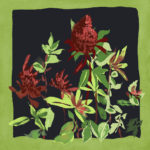Intro: Lovingkindness Continued (11:40)
Note: we had a quick checkin during the introductory remarks, and for your privacy I have cut out all voices but my own.
Guided Meditation (15:25)

There are now hundreds of studies from neuroscience and other fields of medical and psychological research that demonstrate the benefits of meditation. The practice of Lovingkindness has distinctive benefits, which you can read about here.
The research also shows, however, that the benefits accrue from regular practice, even if for only a few moments a day. So I will invite you this week to experiment with integrating a minute or two of lovingkindness into your day, tied to some particular moment or habitual action — perhaps as you wake up or drift off to sleep. Or you might set the intention that when you have an idle moment and reach for your phone, you will pause for a moment first and invoke a few phrases of metta for yourself, someone you know, or the stranger you see across the street.
Sharon Salzberg has made a delightful series of short videos on “Street Lovingkindness,” momentary practices when you are stuck in traffic or waiting in line. They are under two minutes each, and well worth your time. You can see them here.
The power of lovingkindness is experiential rather than intellectual, and so is perhaps best introduced through story. You can find the story of Sharon Salzberg’s first experience with the practice in last week’s resources. And below is an excerpt from Gil Fronsdal’s book A Monastery Within.
Inside Out
An engineer had been a regular and devoted visitor to the monastery for many years. The meditation practice taught at the monastery was the only thing that made sense to him. In fact, the pragmatic logic of the meditation teachings gave him hope that he could overcome his chronic unhappiness and deeply felt pain. He tried all the meditation practices that the Abbess taught him. He began each practice technique with enthusiasm only to have each end with the same frustration. He would encounter a wall he couldn’t pass. The closer he came to the wall the more he would recoil back into trying to think his way out of his pain.
Offering him much support, the Abbess encouraged him to relax, trust the practice, and simply feel his inner pain without reacting to it. After many years the Abbess decided a different approach was needed. During his next visit to the monastery the Abbess told him that if he wanted to continue being her student and to be able to return to the monastery, he would have to take on a special practice. Once he had completed the assignment he could then return for deeper teachings. Once more feeling hope, the engineer quickly agreed.
The Abbess said, “For two years I want you to volunteer ten hours a week at the maternity ward at the local hospital. The hospital needs people to hold babies who are born prematurely. If they don’t receive enough physical contact, the babies will not grow healthily. When you have finished these two years, please come back to see me.”
The man was quite perplexed by this instruction. But because of his trust in the Abbess and his failure to find any relief elsewhere he plunged into volunteering in the maternity ward. He was surprised at how small and fragile the babies were that he held. He would hold them ever so carefully. He would watch their every breath because they all seemed in danger of stopping breathing. He spent a lot of time thinking about how he could more effectively care for the babies he held. But there was nothing more effective than simply holding them against his chest.
After about six months he started feeling something quite new. He started to feel a little spot of warmth and softness in the very center of his being. Since this was a foreign experience that didn’t fit any of the ways he thought about himself, he ignored it.
Ignoring it was the best thing he could have done because it prevented him from interfering with the warmth by thinking about it too much. Over the following months this tender spot grew until it pervaded his body. As it did, the cold, dark wall around his heart slowly relaxed, thawed and dissolved.
When he had completed his two years of volunteering in the maternity ward, the engineer returned to the monastery. The Abbess saw immediately that he was a changed man. He was no longer desperate and he was no longer trying to fit everything he experienced into a conceptual framework. Now he wanted to learn what else the Abbess had to teach.
Giving him a new instruction, the Abbess said to him, “When you meditate, don’t think about what is happening. Rather, let your awareness be seated in the tender warmth you feel in your body. If you do this, any meditation practice you do will be fruitful.” The man found this to be true.
Two Poems from Stephen Dunn:
Happiness
A state you just dare not enter
with hopes of staying,
quicksand in the marshes, and all
the roads leading to a castle
that doesn’t exist.
But there it is, as promised,
with its perfect bridge above
the crocodiles,
and it’s doors forever open.
Kindness
In Manhattan, I learned a public kindness
was a triumph
over the push of money, the constrictions
of fear. If it occurred it came
from some deep
primal memory, almost entirely lost–
Here, let me help you, then you me,
otherwise we’ll die.
Which is why I l love the weather
in Minnesota, ever winter kindness
linked
to obvious self-interest,
thus so many kindnesses
when you need them;
praise blizzards, praise the cold.
Source: Poetry (December 1988
